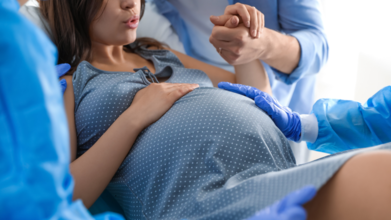- Health Conditions A-Z
- Health & Wellness
- Nutrition
- Fitness
- Health News
- Ayurveda
- Videos
- Medicine A-Z
- Parenting
- Web Stories
Is Coffee Safe For Your Child?

Kid drinking coffee (Credit: Canva)
Coffee culture has seeped into the lives of people of all ages, and it's not just adults who are drawn to the rich, invigorating beverage. Increasingly, teenagers and even middle schoolers are frequenting coffee shops, clutching oversized cups of iced coffee, frappes, and lattes.
But what does this growing trend mean for their health? Should children be drinking coffee, and if so, how much is safe? This article explores the effects of caffeine on children and provides guidance for parents on managing their kids' coffee consumption.
Is Coffee Really Bad for Kids?
The debate over whether coffee is suitable for children is complex. While small amounts of coffee are generally not harmful, several factors warrant consideration before allowing kids to consume it regularly.Caffeine Content
The American Academy of Pediatrics (AAP) advises that children under 12 should avoid caffeine altogether, while the American Academy of Child and Adolescent Psychiatry (AACAP) sets a limit of 100 milligrams (mg) per day for those aged 12 to 18 years. Yet, recent studies highlight a concerning trend: approximately 73% of children and adolescents consume caffeine daily, predominantly through coffee, soda, or energy drinks.
Fat and Added Sugar
A major concern is not just the caffeine content but also the high levels of added sugars and fats in many coffee drinks favored by kids. Beverages from coffee shops often contain sweetened syrups, whipped cream, and other high-calorie ingredients, contributing to unhealthy dietary patterns and potentially displacing healthier options like water.
Side Effects of Coffee in Kids
Children's bodies react differently to caffeine compared to adults. Because they are smaller and still developing, the side effects of caffeine can be more pronounced.
Frequent Urination and Dehydration
Coffee is a diuretic, meaning it can lead to increased urination and a higher risk of dehydration, which can be particularly concerning for children who are already at risk for dehydration.
Altered Mental State
Caffeine consumption can affect children's mental well-being, contributing to heightened feelings of stress, anxiety, and nervousness. Studies have shown a correlation between caffeine intake and increased anxiety levels in children, which can impact their overall quality of life.
Poor Sleep Patterns
Caffeine can disrupt sleep cycles, which is crucial for a child's growth and development. Interrupted sleep can affect both cognitive and physical growth, making it essential for children to maintain a consistent sleep routine.
Caffeine Dependency
Regular consumption of coffee can lead to dependency, with children experiencing withdrawal symptoms such as tiredness, mood swings, difficulty concentrating, and headaches if they miss their regular dose.
Upset Stomach or Nausea
The caffeine and acidity in coffee can cause gastrointestinal issues, including stomachaches and nausea. In severe cases, excessive caffeine intake may lead to overdose symptoms such as high blood pressure, racing heart, and even disorientation.
How Much Coffee Is OK for Kids?
While the AAP recommends avoiding caffeine for children, some parents may consider allowing limited amounts for teens. Following the AACAP's guidelines of no more than 100 mg of caffeine per day for teenagers can be a helpful benchmark. However, consulting with a pediatrician is advised, particularly if the child has underlying health conditions like anxiety, gastrointestinal issues, or heart problems.
Safer Ways for Kids To Drink Coffee
For parents concerned about the amount of caffeine their kids are consuming, there are safer alternatives:
- Decaffeinated coffee contains up to 15 mg of caffeine per 8-ounce serving. It's a less risky choice if you decide to introduce coffee into your child's diet.
- Some coffee shop options, such as herbal teas or "babyccinos" (steamed milk without coffee), offer minimal to no caffeine. These can be suitable alternatives for younger children.
- Diluting coffee with milk can reduce its caffeine content and make it a less potent beverage for kids.
- Be mindful of added sugars and fats in coffee drinks. Opt for simple, less sugary options to avoid excess calorie intake.
The growing trend of coffee consumption among kids and teens presents both opportunities and challenges for parents. While coffee in moderation may not be harmful, the potential side effects and high caffeine content make it important to approach coffee consumption with caution.
Understanding the recommended limits and exploring safer alternatives can help manage your child's caffeine intake and promote better overall health.
It’s essential for parents to stay informed and make thoughtful decisions regarding their child's diet and lifestyle. With careful monitoring and moderation, you can help ensure that your child's coffee habits remain healthy and balanced.
Childhood Obesity Is On The Rise, Doctors Warn; Here’s What Parents Can Do

Credits: Canva
Childhood obesity is a long-term health condition that develops when a child’s weight is above the healthy range for their age, height, and sex. According to Mayo Clinic, doctors define it as having a body mass index (BMI) at or above the 95th percentile for children 2 years and older. September is marked as National Childhood Obesity Awareness Month, and India too is seeing worrying numbers, especially in cities where lifestyle changes, unhealthy diets, and less physical activity are driving the trend.
How Common Is Childhood Obesity?
Childhood obesity is not just a concern in India. In the United States, CDC data from 2017–2020 showed that about 19.7% of children and adolescents between ages 2 and 19 had obesity, roughly 14.7 million young people. Among them, 12.7% were between ages 2–5, 20.7% were 6–11, and 22.2% were 12–19.
Dr Vivek Jain, Senior Director & Unit Head, Paediatrics, Fortis Hospital explains that in recent years, obesity among children has risen sharply due to many factors. Kids are spending more time in front of screens, getting less outdoor play, and attending online classes, all of which cut down their activity levels. At the same time, fast food, sugary drinks, and packaged snacks have become a regular part of diets.
ALSO READ: WHO Guidelines On Weight Loss Drugs For Obesity
Modern lifestyles also encourage frequent dining out, reliance on processed meals, and irregular eating. Add limited access to safe play areas, heavy academic schedules, and family history of obesity, and the risks become even higher. Without intervention, obesity in childhood often continues into adulthood, increasing chances of diabetes, high blood pressure, heart problems, and even some cancers.
Causes Of Childhood Obesity
Obesity develops when children take in more calories than they burn, but it is rarely about laziness or lack of willpower. Several factors play a role:
Genetics and epigenetics
Children with parents or siblings who have obesity are more likely to develop it themselves. Certain genes affect how the body stores and uses energy. Experiences such as trauma or stress can also change how genes work, influencing metabolism and increasing the risk.
Family and home environment factors
Habits at home strongly shape a child’s health. Having sugary drinks, eating oversized portions, frequent snacking on processed foods, dining out instead of cooking, excess screen time, lack of exercise, poor sleep, and even secondhand smoke exposure can all contribute.
Social determinants of health
The surroundings in which children grow up also matter. Affordable healthy food may not always be accessible, and fast-food outlets may be more common. Lack of transport, social support, or safe recreational areas adds to the challenge. School meals and activities also influence a child’s diet and daily routine.
Cultural factors
Advertising and marketing of fast foods and sugary drinks—whether on TV, online, or in stores, make unhealthy options more appealing to children.
How To Prevent Childhood Obesity
Prevention needs a joint effort from families, schools, communities, and policymakers. Parents play the most important role, as they shape habits from an early age. Dr. Vivek suggests:- Balanced nutrition: Encourage home-cooked meals with fruits, vegetables, whole grains, and lean proteins. Limit fried foods, sugary drinks, and packaged snacks.
- Physical activity: Aim for at least 60 minutes of active play or exercise daily, such as sports, cycling, or outdoor games.
- Reduced screen time: Limit television, mobile, and gaming time to help children stay active and sleep better.
- Family involvement: Lead by example—eat meals together, exercise as a family, and make health a priority.
- School initiatives: Schools should provide nutritious meals, promote physical education, and teach healthy habits.
A Viral Instagram Post Makes Several Claims On What Makes Your Kids Sick After A Swimming Session, We Fact Checked It For You, Here's What We Found

Credits: Canva
As summers are here and so are the pool sessions, an Instagram post is making rounds on the social media platform by Ilia Ototiuk, who calls himself an ambassador of discipline, mental and physical wellbeing. The post lists down the reason why kids get sick after a swimming session. The post mentions that the reason is not water, but something else. Health And Me decided to fact check each claim made on the post, and here is what we found.
Claim #1: “The problem isn’t cold water or swallowing pool water.”
Fact Check
According to the US Centers for Disease Control and Prevention (CDC), swallowing or inhaling contaminated pool water can absolutely cause illness. particularly gastrointestinal infections like diarrhea. Germs such as Cryptosporidium can survive for over a week in properly treated pools. While temperature itself doesn’t directly cause colds, swallowing pool water can spread pathogens.
Verdict: Cold water alone won’t give a child a cold, but contaminated water can cause infections.
Claim #2: “The real immune crash happens right after getting out. The body is warm, skin is wet...”
Fact Check
The claim that wet skin and drafts cause an “immune system shutdown” isn’t supported by medical evidence. What actually happens is explained by US Masters Swimming: sudden exposure to cold water can trigger cold water shock, affecting heart rate, breathing, and circulation. Extended exposure can lead to hypothermia or afterdrop (continued cooling even after leaving the water).
Verdict: The body does not “shut down immunity.” Instead, risks are linked to cold-water shock and hypothermia, especially if kids don’t warm up quickly after swimming.
Claim #3: “Sitting around in wet swimsuits for 5–10 minutes makes the body vulnerable.”
Fact Check
As per Texas A&M Health and the Mayo Clinic, sitting in wet swimsuits doesn’t cause colds, but it can cause fungal infections (like yeast infections or jock itch) and skin irritation from chafing. Prolonged dampness makes an ideal environment for fungi and bacteria.
Verdict: The real risk is fungal or bacterial skin infections, not colds. Parents should change kids into dry clothes quickly after swimming.
Claim #4: “Not drying hair causes sinus overload and colds.”
Fact Check
The Cleveland Clinic explains that wet hair itself does not cause colds. Viruses such as rhinovirus are the culprits, not damp scalps. While cold environments may help viruses spread more easily, wet hair is not a direct cause of runny noses, sore throats, or fevers.
Verdict: Leaving hair wet or letting it "air dry" won’t cause colds. However, drying kids’ hair after swimming can help them stay comfortable and prevent feeling chilled.
Claim #5: “Skipping post-swim snacks weakens immunity.”
Fact Check
According to the BBC 2023 report, post-exercise nutrition is important, especially within 30–60 minutes after swimming. The body needs carbohydrates to replenish glycogen and protein to repair muscles. Skipping food doesn’t directly cause infections, but poor recovery can increase fatigue and stress, making the body less resilient.
Verdict: It’s true that kids should eat a balanced snack after swimming, ideally carbs + protein, but saying “immunity weakens” without food is an exaggeration.
Fact Check: Is Giving Birth On Your Back Against Your Body's Natural Anatomy?

Credits: Canva
"I may or may not burst some bubbles with this comment, but what if I told you that your pelvis was in fact not too small and or that your baby's head was in fact not too big?" says Amber Grimmett, a US-based Pregnancy and
Postpartum Coach. In her post, she also writes that the position most women give birth in, also called the lithotomy position or lying on your back is "against your body's natural birth mechanics". In a video she posted on her Instagram @fierce.not.fragile, she talks about pelvis and baby's head size, explaining how the birthing position that has been made standard may not be right.
She says that when the mother lies flat on her back with knees wide, her tailbone cannot move freely and the pelvic outlet, the space baby needs to exit, "literally closes off".
This, she says, creates a domino effect. Then comes longer labors, more interventions, and higher risk of pelvic floor dysfunction. "Your body was designed to birth, but not in positions that fight against its natural design," she writes.
What Does Science say?
We did a fact check on her claim and here's what we found.
For most women in the United States today, giving birth means lying on a bed, feet in stirrups, and being told when and how to push. But mounting research, including a 2014 study published in The Journal of Perinatal Education, titled, 'Healthy Birth Practice #5: Avoid Giving Birth on Your Back and Follow Your Body’s Urge to Push' suggests this common practice, known as the supine or lithotomy position—might not actually be the safest or most effective way to bring a baby into the world.
How Birth Ended Up on Its Back
For centuries, women birthed in positions that worked with gravity, standing, squatting, sitting, or even using stools or ropes for leverage. These upright positions made physiological sense: gravity helped the baby descend, shortened labor, and reduced maternal fatigue.
Then came King Louis XIV of France. Fascinated by childbirth, he reportedly preferred to watch his mistresses deliver, and lying flat gave him the best view. The practice caught on among European aristocracy and eventually spread widely.
By the early 1900s, births had largely moved from homes to hospitals. Doctors saw childbirth less as a natural process and more as a medical procedure. Putting women on their backs gave physicians easier access for interventions such as forceps delivery, anesthesia, and continuous fetal monitoring. Convenience for the doctor—not necessarily benefit for the mother or baby, became the standard.
The Problem with the Supine Position
Research over the past three decades has consistently shown that giving birth lying flat has no clear benefits for either mother or baby. In fact, there are multiple disadvantages:
- Longer Labor: When women lie flat, the baby must work against gravity, which can slow descent.
- Narrower Pelvis: The supine position can actually reduce pelvic diameter, making delivery more difficult.
- Increased Risk of Interventions: Supine births are linked with more use of forceps, vacuum deliveries, and episiotomies.
- Reduced Blood Flow: Lying on the back can compress major blood vessels behind the uterus, reducing blood flow to the baby.
- More Perineal Trauma: Directed, forceful pushing while on the back is associated with more tears and a weakened pelvic floor, raising the risk of urinary incontinence later.
Despite this, U.S. survey data shows that nearly 70% of births still happen in supine or lithotomy positions, with fewer than 10% of women using traditional squatting, standing, or side-lying positions.
The Case for Upright and Spontaneous Pushing
Standing, kneeling, and squatting use gravity to help the baby descend and can even widen the pelvic outlet, giving more room for delivery. Even side-lying, which is gravity-neutral, has been shown to reduce perineal tearing.
Equally important is how women push. Many hospitals still direct women to push forcefully for long periods, holding their breath. But evidence shows that spontaneous, self-directed pushing—where the woman follows her own urge, improves oxygenation, reduces maternal stress, and lowers the risk of fetal distress.
In fact, research has found that directed pushing only shortens labor by about 13 minutes on average, a difference not considered clinically significant but one that may come at the cost of pelvic floor damage.
Rethinking Hospital Policies
Some hospitals have strict time limits on how long the second stage of labor (pushing phase) can last before recommending interventions such as a C-section, even if there are no signs of danger for mother or baby. Recent guidelines from the American College of Obstetricians and Gynecologists (ACOG) now acknowledge that the second stage can safely last much longer, up to five hours for first-time mothers with an epidural.
However, there is little emphasis on letting women move freely, change positions, or delay pushing until their natural urge returns. This gap between research and practice persists, though midwives and doulas are often more supportive of these evidence-based approaches.
© 2024 Bennett, Coleman & Company Limited

